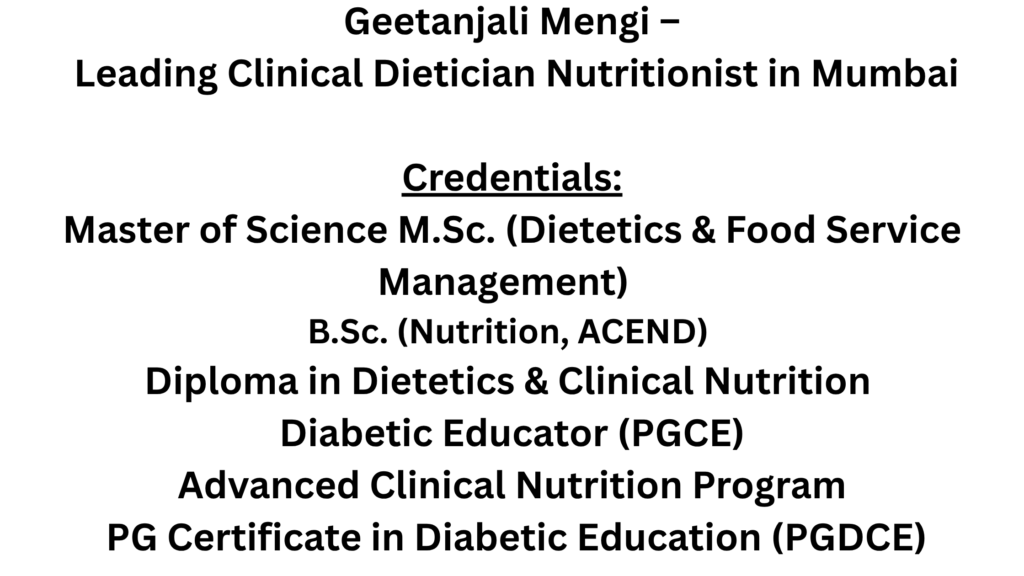PCOS Dietician in Mumbai India
Diet and exercise are important parts of managing PCOS (Polycystic Ovary Syndrome). This is because young women with PCOS often have higher levels of insulin (a hormone) in their blood, and many have trouble maintaining a healthy weight.
Knowing the right foods to eat as well as the kinds of food to limit can improve the way you feel. It will also help you lose weight. Eating well, staying active, and maintaining a healthy weight (or losing even a small amount of weight if you’re overweight) can improve PCOS symptoms.
Nutritious diet given by Reg Dietician Geetanjali Ahuja Mengi will also help to reduce the risk of developing symptoms of polycystic ovary syndrome, including weight management and helping to regulate insulin levels.
We at Gmn Clinic take certain body measurements to see if you are overweight, underweight or carrying excess weight around the middle. This is so they can build a realistic, effective nutrition programme including a tailored PCOS Diet, unique for you.
This may involve you providing a food diary. You will be asked to record everything you have consumed over a period of time before or during the sessions, with details of your moods and menstrual cycle included.
FEATURES OF OUR DESIGNED PROGRAM
Smart food and water reminders sent directly to your whatsapp which ensure your progress stays on track at all times.
Get exclusive access to a lifestyle journal and a premium diet essentials bag, setting you up for seamless healthy living.
Enjoy unlimited, immediate guidance from expert dieticians, no matter when or where support is needed.
Receive customized recommendations for physical activities, keeping you motivated and energized every day.
From Fast Diets to Party, Travel, Regional, and Festival Diets, our solutions cater to your unique needs, tastes, and schedules.
Benefit from regular, one-on-one check-ins every 10 days with a dedicated dietician to celebrate your wins and fine-tune your plan.
Join a vibrant social media forum packed with expert videos, blogs, and daily healthy living tips to inspire your journey.
Stay accountable and focused with real-time tracking by skilled junior dieticians.
Explore an ever-growing collection of delicious, diet-friendly recipes through online and offline videos, from timeless classics to the latest culinary trends.
Dietician reviews meal photo for personalized feedback and improvement.

Frequently Asked Questions (FAQs)- PCOS Diet
PCOS affects hormones, weight, and fertility. A customized diet can balance hormones, improve energy, and reduce symptoms—starting with your first consultation.
Our expert dieticians create a personalized plan tailored to your body, lifestyle, and goals to manage PCOS effectively—so you don’t waste time on guesswork.
While diet can’t cure PCOS, it can drastically improve symptoms, menstrual regularity, and energy. Our clients often see noticeable improvements within weeks.
Yes. Our tailored plans focus on sustainable weight loss without restrictive dieting, helping you feel confident and energized.
Many clients notice reduced cravings, better menstrual cycles, and more energy in just 4–6 weeks.
Yes. Balanced nutrition supports ovulation and fertility, enhancing your chances naturally when combined with lifestyle changes.
No. We include flexible options so you can enjoy meals while managing PCOS without guilt.
While helpful, our diet plans are effective on their own. Adding movement simply accelerates results.
Book your consultation today. Take the first step toward hormone balance, weight control, and a healthier, more confident you.
Ms. Geetanjali will consult you and all the follow-ups will be taken by her.
Free Consultation – Start Your Wellness Journey Today
Book a complimentary, no-obligation phone consultation and discover how we can help you achieve your health goals. During this call, we will:
* Give you a clear overview of how our nutrition program works
* Understand your personal health goals and expectations
* Explain our pricing, packages, and payment options
* Clarify how insurance coverage may apply
* Help you choose the right practitioner for your needs
* Answer all your doubts and questions
* And guide you with anything else you may need
Take the first step toward a healthier, happier you—your free consultation awaits!
